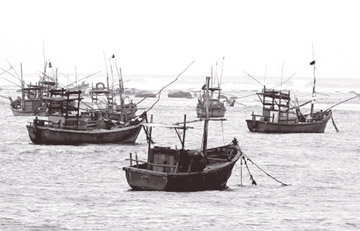|
Seafarers’ predicament:
Striking a balance between safety and comfort
By Ranil Wijayapala
 The November 25th calamity due to gale forced winds striking the
southern coast creating havoc among the people, raised many issues
regarding safety of fishermen. It brought disaster to many fishermen in
Galle and Matara as the gusty winds took away the lives of 22 fishermen
while another 11 remains missing. The November 25th calamity due to gale forced winds striking the
southern coast creating havoc among the people, raised many issues
regarding safety of fishermen. It brought disaster to many fishermen in
Galle and Matara as the gusty winds took away the lives of 22 fishermen
while another 11 remains missing.
Their sorrow over the deaths of their loved ones is still haunting
the fishing community as many of the fishermen who lost their lives in
the calamity are sometimes the sole breadwinner of their families.
Their family members still live with the hope that their husbands,
fathers and brothers may reappear from somewhere in the sea and come
back to their homes.
It was the Meteorological Department which got the blame for not
issuing timely warning for the fishermen about the windy situation that
created havoc in the South on that fateful day. Many of the fishermen
accused the Meteorological Department and also blamed them for not
taking enough measures to save the lives of the fishermen who were
struggling with the rough sea after their boats capsized.
True, the Meteorological Department did not issue warning to the
fishermen and the Department accepts the fact that they could not
predict the situation beforehand due to some factors.
Warning

Kumari Withana |

Asoka Jayaweera |

Lal de Silva |
After almost two weeks of the incident the Meteorological Department
on December 7, issued a bad weather warning to the fishermen in the
North, South and West but the anticipated wind speed did not occur. The
blame once again went to the Meteorological Department for hampering
their livelihood by issuing a bad weather warning that had not
materialised in the surface.
The weather has become a major factor affecting the day-to-day lives
of fishermen and they are prepared to take that risk to continue their
livelihood irrespective of the threats from the weather.
But whether they can rely on the weather forecast on the safety of
their lives is a moot point in the aftermath of this unfortunate
incident.
So there must be measures that can guarantee the safety of the
fishermen in their struggle with the sea in such a calamity. Therefore,
the Sunday Observer thought of inquiring from the relevant authorities
about the safety measures that can guarantee the safety of the fishermen
while engaged in fishing .
Forecast
According to Assistant Director of the Fisheries Department Lal de
Silva and the Chief Radio Officer Asoka Jayaweera they only can issue
warning to the fishermen based on the routine weather forecast from the
Meteorological Department.
“Other than that we cannot issue bad weather warning to the fishermen
through our radio station based on the reports we receive from other
organisations. What we can do is to clarify those reports from the
Meteorological Department and that also didn’t happen on the November
25”, Jayaweera added.
According to Lal de Silva the number of deaths and the damages to the
boats could have been minimised if the bad weather warning is issued to
the fishermen by the Meteorological Department.
But even after the incident there were no measures to search for the
missing fishermen until they were washed ashore or found dead in the
sea.
According to Asoka Jayaweera, the number of deaths would have been
minimised if the fishermen adhered to the rules and regulations issued
to them by the Fisheries Department.
“I am not saying that they all could have been saved by the rescuers
from the Navy but many of them could have been saved if they were
wearing life jackets made mandatory by the Fisheries Department. But we
could not find a single fisherman wearing a life jacket”, he said.
“The first thing is that fishermen were not given a warning in this
regard and they were not aware of such impending disaster as the Met
Department had not issued any warning. On the other hand the fishermen
concerned also had not taken adequate measures in terms of self safety.
We have been addressing the issue for so many years”, he added.
According to Jayaweera even under normal conditions they are required
to wear life jackets, life wings and carry a first aid box. In addition
they have to carry a fire extinguisher. These things have been made
mandatory for the fishermen.
“On the part of the fishermen they are reluctant to comply with these
regulations although we carried out so many awareness program through
the media, through our assistant directors and through seminars and
demonstrations conducted in collaboration with Food and Agriculture
Organisation”, he added.
“They are reluctant to wear life jackets and they say that it hampers
their fishing activities.
But we have introduced these measures for their safety and they must
get used these measures for their safety, without blaming the
authorities when they faced incidents of this nature”, he added.
However, the Fisheries Department has no resources to check each and
every fishing boat for the use of life jackets as many small boats sail
from different areas.
“With regard to fishing trawlers there is no problem as they are
leaving from Fisher harbours. But we or the Navy cannot check safety
equipment on each and every trawler going fishing. It is the duty of the
skipper or the boat owner to see that they are having this gear prior to
leaving the harbour.
Trawlers
According to Assistant Director Lal de Silva 20 Coastal Radio Centres
can communicate with the fishing trawlers when they are in distress and
send rescue teams if they face any incidents. But many of the boats that
got damaged on November 25 were small.
“The Fisheries Department does not have resources to send rescue
teams when fishermen are in distress. Prior to the Tsunami the Fisheries
Department had several big boats but all of them were destroyed in the
Tsunami. Therefore we have to seek assistance from the Coast Guard or
the Sri Lanka Navy in this regard”, he added.
“In the Sri Lankan waters the Navy is in a position to help fishermen
and when the fishing boats are in the territorial waters of other
countries we have to seek assistance from the relevant countries”, he
added.
According to Legal Officer Kumari Withana, although fishermen are not
adhering to the safety regulations there are so many regulations under
the Fisheries and Aquatic Resources Act to guarantee their safety in the
sea.
Local Fishing Boats (Life Jackets) regulation under the Fisheries and
Aquatic Resources Act was gazetted on October 9, 2008 to make it
mandatory for the owner or proprietor of every fishing boat to ensure
that every boat engaged in fishing activities wear Life Jackets which
conform to accepted standards.
Under this regulation the owner or proprietor of any fishing boat
shall inform and instruct every member of its crew, of the circumstances
in which they are expected to use a life Jacket, the place at which the
life jackets are stored and the manner the jackets are to be used.
In addition, the regulation also emphasises that it shall be the duty
of every owner or proprietor of a fishing boat to cause the life jackets
carried on-board these fishing boats to be regularly inspected and where
necessary, replaced.Any owner or proprietor who contravenes the
provisions of these regulations shall be guilty of an offence.“We are
strictly implementing this regulation with regard to the multi-day
fishing trawlers and one-day fishing boats. But now this has been made
mandatory for the small fishing boats too”, Withana added.
“Even when the Fisheries Officers are travelling in boats for any
inspection it has been made mandatory for them to wear life jackets,”
she added.
According to the Legal Officer there are practical difficulties in
implementing this regulation as small fishing boats leaving the coast
cannot be checked for adhering to these regulations, although they can
inspect fishing trawlers leaving fishing harbours.
“We have not put forward this as a condition when issuing licences
for the fishing boats but we have conducted a series of awareness
programs to educate them about the life jacket regulations. So we have
not taken any legal action against the fishermen and those who are
violating this regulation under the Fisheries Act. In the future we are
taking strict possible action against them”, she added.
Under Fisheries and Aquatic Resources Act, all boats engaged in
fishing activities have to be registered with the Fisheries Department.
“To get their boats registered they have to show the sea-worthiness
certificate to the Fisheries Department. The other requirement is the
insurance certificate. These two requirements are necessary to get their
boats registered in the Fisheries Department,” she added.
Situations
However she pointed out that there are situations where the fishermen
pay the first instalment of the insurance and get their license renewed
from the Fisheries Department. “But only when they are caught in an
accident they remember the balance payment of the insurance”, she added.
“This cannot be checked even by the Navy as the Navy is looking only
for the registration certificate. We have discussed this matter with
Insurance companies too, but due to various economic constraints on the
part of the fishermen things are not happening as we expected”, she
added.
“We are imposing all these rules and regulations to ensure their
safety. We have made it mandatory to wear life jackets because we are
concerned about their safety. We have also made the insurance
certificate mandatory as they can receive compensation if they face any
unfortunate incidents in the sea”.
“Apart from these measures, we are also inspecting the seaworthiness
of the boats as their lives are in danger if they use boats which are
not suitable to go for fishing. If they face windy situation they have
to be prepared to face those situations”, she added.
The Fishing Boats Safety (Design, Construction and Equipment)
Regulations 2009 gazetted under the Fisheries and Aquatic Resources Act,
No. 2 of 1996 has listed safety specifications of the fishing boats to
ensure that all the boats manufactured follow the safety specifications.
The gazette notification in this regard has been issued on May 5, 2009.
These regulations widely deals with the specification of a fishing
boat to make sure that all the boats added to the industry are
seaworthy.“It is through these measures that the Fisheries Department is
taking measures to ensure the safety of the fishermen. Other than that
the Fisheries Department has not been allocated funds to compensate for
the victims. That is why we are introducing these rules and regulations,
to reduce the risky situation they have to face.
“We have to think of these regulations in a humane manner, and as
people engaged in this industry are from poor community. Though we have
formulated all these laws we are going to implement these laws step by
step.
We can’t forcibly enforce these laws. We have to take action
smoothly”, she added.
On the other hand, even after facing such an unfortunate situation
the Fishermen and their dependants are not in a position to receive any
compensation as many of them have not become members of the insurance
scheme.
Secretary to the National Fisheries Organisation, Pemasiri Perera,
said that non of the victims of the November 25 incident have been
insured under the “Dheewara Diriya” insurance scheme initiated under the
Fisheries Ministry.
Bothered
“Under “Dheewara Diriya” insurance scheme fishermen have to pay only
Rs.750 per year but they have not even bothered about it until they
become victims. So far only 10,000 fishermen have become members of this
insurance scheme,” Pemasiri added.
“As a fisheries organisation we are conducting a series of seminars
to educate them on these matters through our branches. But it is very
difficult to get the participation of the fishermen towards such
programs as they are thinking of them only when they confront with such
issues only”, he added.
However he said that the Fisheries Ministry is doing its best to
educate them on such matters to make their lives safer in the sea
through various mechanisms. “The incident on November 25 was an eye
opener for them”, he added.
|

